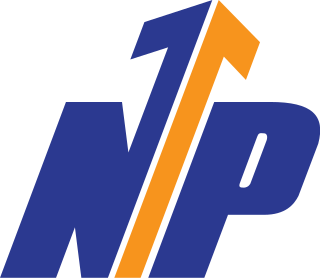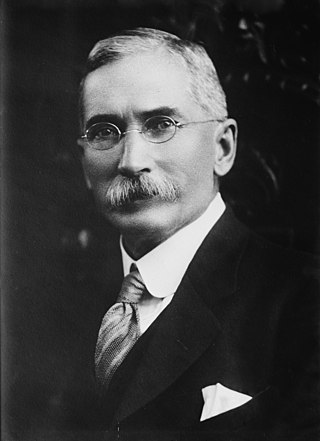Afrikaner Party | |
|---|---|
 | |
| Founder | Nicolaas Havenga |
| Founded | 1941 |
| Dissolved | 1951 |
The Afrikaner Party (AP) was a South African political party from 1941 to 1951.
Afrikaner Party | |
|---|---|
 | |
| Founder | Nicolaas Havenga |
| Founded | 1941 |
| Dissolved | 1951 |
The Afrikaner Party (AP) was a South African political party from 1941 to 1951.
The Afrikaner Party's roots can be traced back to September 1939, when South Africa declared war on Germany shortly after the start of World War II. The then Prime Minister J.B.M. Hertzog and his followers did not agree with this move and broke away from the United Party to form the Volksparty (People's Party).
The Volksparty later split: one faction joined the Gesuiwerde Nasionale Party (Purified National Party) to form the Herenigde Nasionale Party (Re-united National Party) while the other faction became the Afrikaner Party under the leadership of N.C. Havenga.
After the 1948 South African general election the Herenigde National Party and Afrikaner Party formed a coalition in order to achieve an absolute majority in parliament. The Afrikaner Party was very much the junior partner in this, however, and in 1951, the two parties amalgamated to become the National Party.
| Election year | # of total votes | % of overall vote | # of seats won | Rank |
|---|---|---|---|---|
| 1943 [1] | 15,607 | 1.78% | 0 | 5/6 |
| 1948 [2] | 41,885 | 3.93% | 9 | 3/4 |

Hendrik Frensch Verwoerd, also known as H. F. Verwoerd, was a South African politician, scholar, and newspaper editor who was Prime Minister of South Africa and is commonly regarded as the architect of apartheid and nicknamed the "father of apartheid". Verwoerd played a significant role in socially engineering apartheid, the country's system of institutionalized racial segregation and white supremacy, and implementing its policies, as Minister of Native Affairs (1950–1958) and then as prime minister (1958–1966). Furthermore, Verwoerd played a vital role in helping the far-right National Party come to power in 1948, serving as their political strategist and propagandist, becoming party leader upon his premiership. He was the Union of South Africa's last prime minister, from 1958 to 1961, when he proclaimed the founding of the Republic of South Africa, remaining its prime minister until his assassination in 1966.

The National Party, also known as the Nationalist Party, was a political party in South Africa from 1914 to 1997, which was responsible for the implementation of apartheid rule. The party was an Afrikaner ethnic nationalist party, which initially promoted the interests of Afrikaners but later became a stalwart promoter and enactor of white supremacy, for which it is best known. It first became the governing party of the country in 1924. It merged with its rival, the SAP, during the Great Depression, and a splinter faction became the official opposition during World War II and returned to power. With the National Party governing South Africa from 4 June 1948 until 9 May 1994, the country for the bulk of this time was only a de jure or partial democracy, as from 1958 onwards non-white people were barred from voting. In 1990, it began to style itself as simply a South African civic nationalist party, and after the fall of apartheid in 1994, attempted to become a moderate conservative one. The party's reputation was damaged irreparably by perpetrating apartheid, and it rebranded itself as the New National Party in 1997 before eventually dissolving in 2005.

Daniël François Malan was a South African politician who served as the fourth prime minister of South Africa from 1948 to 1954. The National Party implemented the system of apartheid, which enforced racial segregation laws, during his tenure as Prime Minister.

Johannes Gerhardus Strijdom, also known as Hans Strijdom and nicknamed the Lion of the North or the Lion of Waterberg, was the fifth prime minister of South Africa from 30 November 1954 to his death on 24 August 1958. He was an uncompromising Afrikaner nationalist and a member of the largest, baasskap faction of the National Party (NP), who further accentuated the NP's apartheid policies and break with the Union of South Africa in favour of a republic during his rule.
The Afrikaner Broederbond (AB) or simply the Broederbond was an exclusively Afrikaner Calvinist and male secret society in South Africa dedicated to the advancement of the Afrikaner people. It was founded by H. J. Klopper, H. W. van der Merwe, D. H. C. du Plessis and the Rev. Jozua Naudé in 1918 as Jong Zuid Afrika until 1920, when it was renamed the Broederbond. Its influence within South African political and social life came to a climax with the 1948-1994 rule of the white supremacist National Party and its policy of apartheid, which was largely developed and implemented by Broederbond members. Between 1948 and 1994, many prominent figures of Afrikaner political, cultural, and religious life, including every leader of the South African government, were members of the Afrikaner Broederbond.

The Herstigte Nasionale Party is a South African political party which was formed as a far-right splinter group of the now defunct National Party in 1969. The party name was commonly abbreviated as HNP, evoking the Herenigde Nasionale Party, although colloquially they were also known as the Herstigtes. The party is, unlike other splinter factions from the National Party, still active but politically irrelevant.
The South African Party was a political party that existed in the Union of South Africa from 1911 to 1934.

General elections were held in South Africa on 26 May 1948. They represented a turning point in the country's history, as despite receiving just under half of the votes cast, the United Party and its leader, incumbent Prime Minister Jan Smuts, were ousted by the Herenigde Nasionale Party (HNP) led by D. F. Malan, a Dutch Reformed cleric.

The Afrikaner Volksfront was a separatist umbrella organisation uniting a number of right-wing Afrikaner organisations in South Africa in the early 1990s.

General elections were held in South Africa on 7 July 1943 to elect the 150 members of the House of Assembly. The United Party of Jan Smuts won an absolute majority.
The Herenigde Nasionale Party was a political party in South Africa during the 1940s. It was the product of the reunion of Daniel François Malan's Gesuiwerde Nasionale Party and J.B.M. Hertzog's breakaway Afrikaner nationalist faction of the United Party in 1940.

The South African Labour Party, was a South African political party formed in March 1910 in the newly created Union of South Africa following discussions between trade unions, the Transvaal Independent Labour Party, and the Natal Labour Party. It was a professedly democratic socialist party representing the interests of the white working class.

Afrikaner nationalism is a nationalistic political ideology created by Afrikaners residing in Southern Africa during the Victorian era. The ideology was developed in response to the significant events in Afrikaner history such as the Great Trek, the First and Second Boer Wars and opposition to South Africa's entry into World War I.

National Action was a short-lived South African political party formed in December 2001 by the Afrikaner Eenheidsbeweging's (AEB) Cassie Aucamp and former National Party minister Danie Schutte. Aucump retained dual membership of the parties before leaving the Afrikaner Eenheidsbeweging (AEB) in the 2003 floor-crossing window. The AEB, along with other Afrikaner parties, was merging into the Freedom Front Plus to contest the 2004 elections but the National Action, claiming to support Afrikaner interests, remained separate, and competed in the 2004 elections. It won no seats in the National Assembly of South Africa or any of the provincial legislatures. It did not contest the 2009 elections.

Greyshirts or Gryshemde is the common short-form name given to the South African Gentile National Socialist Movement, a South African Nazi movement that existed during the 1930s and 1940s. Initially referring only to a paramilitary group, it soon became shorthand for the movement as a whole.

Nicolaas Christiaan Havenga was a South African politician who served as Finance Minister in the governments of J. B. M. Hertzog and Daniel François Malan.
The Purified National Party was a break away from Hertzog's National Party which lasted from 1935 to 1948.

The Volksparty (VP) was a short-lived South African political party from 1939 to 1941.

Johannes Albertus Munnik Hertzog was a South African politician, Afrikaner nationalist, cabinet minister, and founding leader of the Herstigte Nasionale Party. He was the son of J. B. M. (Barry) Hertzog, a former Prime Minister of the Union of South Africa.
The Afrikaner Eenheidsbeweging was a small South African political party founded in Pretoria in 1998. It was led by Cassie Aucamp, and based on Afrikaner nationalism. The party participated in the South African general election of 1999, in which it gained one member elected to the National Assembly. In September 2003, shortly before the 2004 election, the AEB merged with two likeminded parties, the Conservative Party and the Freedom Front, to form a new party known as the Freedom Front Plus, which went on to win 4 parliamentary seats.